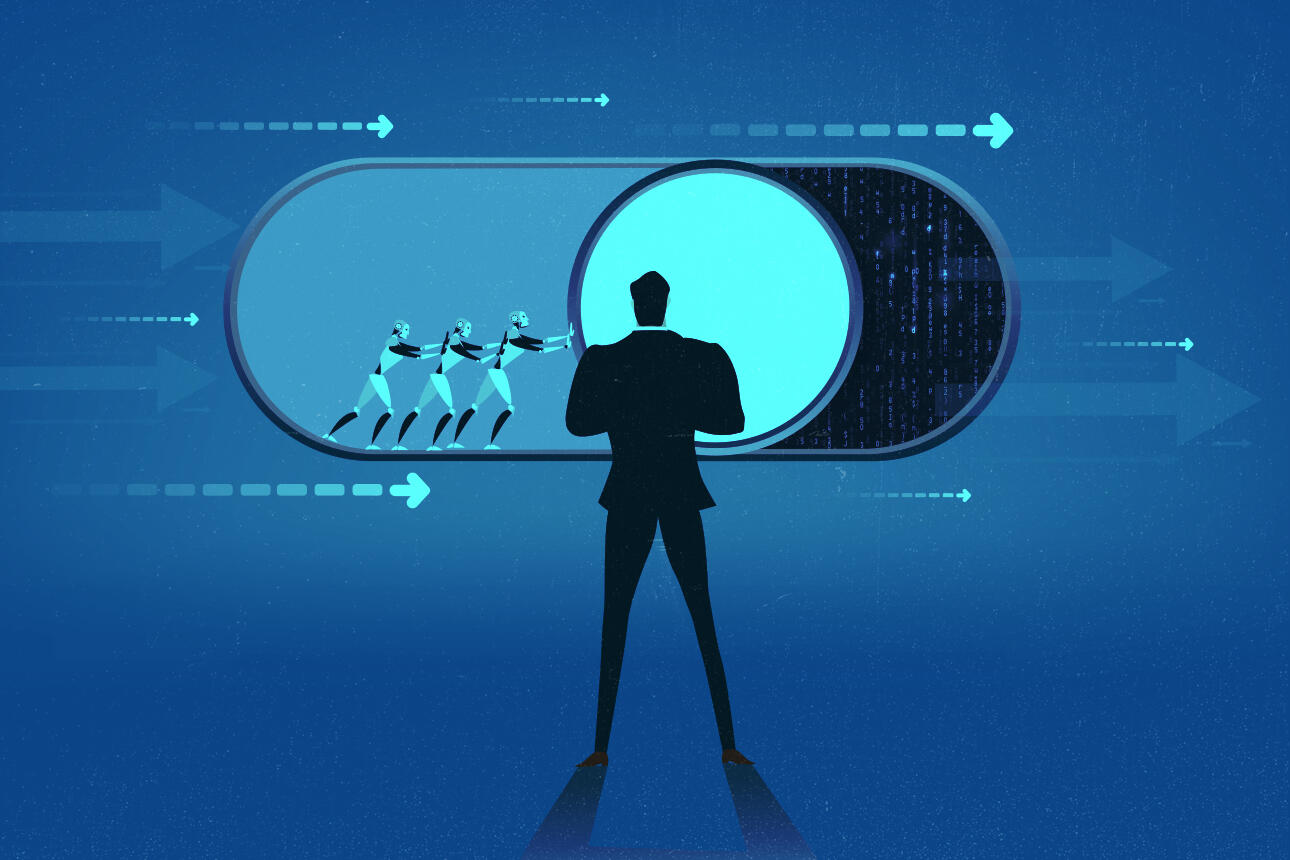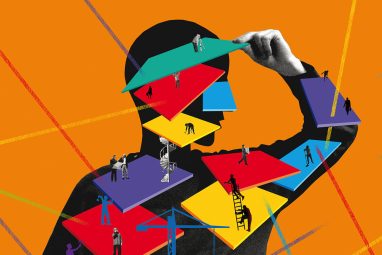Shaping the Workforce for an AI Everything World
The AI revolution is fundamentally altering the workforce landscape. Jobs requiring AI expertise are growing 3.5 times faster than other roles.
Topics
SPONSORED CONTENT
News
- Identity-based Attacks Account for 60% of Leading Cyber Threats, Report Finds
- CERN and Pure Storage Partner to Power Data Innovation in High-Energy Physics
- CyberArk Launches New Machine Identity Security Platform to Protect Cloud Workloads
- Why Cloud Security Is Breaking — And How Leaders Can Fix It
- IBM z17 Mainframe to Power AI Adoption at Scale
- Global GenAI Spending to Hit $644 Billion by 2025, Gartner Projects

[Image source: Krishna Prasad/MITSMR Middle East]
Artificial intelligence (AI) has moved beyond being a cutting-edge technology to becoming the backbone of economic transformation. Its potential is vast—an estimated $15.7 trillion global economic contribution by 2030—and its influence profound, reshaping industries, decision-making, and customer experiences. However, as AI adoption accelerates, the ability to harness its power depends on one critical factor: people.
Organizations across the globe face a stark reality. While AI is expected to create 97 million jobs by 2025, a significant talent gap threatens to hinder progress. Addressing this challenge requires a strategic shift in how companies approach workforce development. Leaders must prioritize upskilling, embrace cross-disciplinary learning, and build agile teams that can adapt to rapidly evolving technologies.
The Strategic Importance of AI Upskilling
The AI revolution is fundamentally altering the workforce landscape. Jobs requiring AI expertise are growing 3.5 times faster than other roles, according to PwC, outpacing the availability of skilled professionals. Companies that fail to address this gap risk falling behind competitors that are investing heavily in AI training and integration.
However, effective upskilling is not just about technical proficiency. It requires aligning AI knowledge with business strategy, fostering innovation, and addressing ethical considerations. Leaders must develop a comprehensive roadmap to build workforce resilience in three critical areas:
Technical Foundations
Foundational AI skills are no longer confined to data scientists and engineers. Professionals across functions, from marketing to supply chain management, need a baseline understanding of AI concepts to collaborate effectively. Topics like machine learning, data analysis, and predictive modeling are essential components of corporate training programs.
Industry-Specific Applications
The transformative power of AI lies in its ability to address unique challenges within industries. For instance:
- In retail, AI enhances demand forecasting and customer personalization.
- In healthcare, it streamlines diagnostics and improves patient outcomes.
- In energy, it optimizes power usage and drives decarbonization efforts.
Customized training programs that connect these applications to real-world scenarios ensure that employees can implement AI solutions with immediate impact.
Ethics and Responsible AI
As AI adoption grows, so do concerns about privacy, bias, and accountability. Leaders must prioritize ethical frameworks that govern AI deployment. Training programs should include modules on fairness in AI, explainability, and compliance with global regulatory standards to build trust and long-term value.
The Role of Leaders in Driving AI Transformation
Leadership in the AI era is as much about vision as it is about execution. Beyond building technical capabilities, leaders must champion a culture of learning and adaptability. Research from the World Economic Forum highlights that 77% of companies plan to invest in workforce training by 2025. However, the effectiveness of these investments depends on executive commitment to fostering an environment where employees feel empowered to innovate.
Key Leadership Actions:
- Embed Lifelong Learning: Create structures that support continuous education, such as partnerships with academic institutions and industry certifications.
- Promote Interdisciplinary Collaboration: Encourage teams to break silos and combine expertise across AI, business strategy, and human resources to drive holistic solutions.
- Prioritize Diversity in AI Development: A diverse workforce brings varied perspectives, reducing biases in AI systems and driving inclusive innovation.
A New Model for AI Education: From Skills to Strategy
Traditional training models often focus on skill acquisition in isolation. However, the rapid evolution of AI demands a more dynamic approach—one that integrates learning with strategic decision-making. Emerging frameworks for AI education emphasize:
- Scenario-Based Learning: Immersive workshops that simulate real-world challenges, enabling participants to apply AI concepts in context. For example, exploring the ethical dilemmas of deploying generative AI or addressing supply chain disruptions with predictive analytics.
- Global Knowledge Networks: Collaborative forums that bring together industry experts, policymakers, and academia to share best practices and foster innovation.
- Leadership-Centric Training: Programs designed to equip executives with the tools to align AI initiatives with organizational goals, measure ROI, and manage risks.
Future-Proofing Organizations Through Strategic Upskilling
The organizations that thrive in the AI economy will be those that view workforce development not as an operational necessity but as a strategic priority. Upskilling must be embedded in business strategy, with clear metrics to measure its impact on innovation, productivity, and market competitiveness.
Key Considerations for Leaders:
- Adopt a Forward-Looking Mindset: Anticipate emerging AI trends—such as quantum computing and generative AI—and prepare the workforce for their implications.
- Leverage Data for Tailored Learning Paths: Use AI-driven analytics to identify skill gaps and personalize training programs to individual needs.
- Scale Ethical AI Practices: Establish governance models that ensure AI systems align with organizational values and societal expectations.
AI is reshaping the workforce itself. The leaders who succeed will be those who invest strategically in their people, bridging the gap between technological innovation and human potential.
For leaders, innovators, and professionals looking to accelerate their AI journey, Ai Everything GLOBAL, the world’s premier AI event, offers an opportunity to gain practical insights, network with global experts, and receive certified training. Organized by Dubai World Trade Centre (DWTC) in affiliation with GITEX GLOBAL, the world’s largest tech show, it showcases AI’s transformative power across industries and regions, converging influential stakeholders to define new boundaries for AI innovation.
Taking place across the St. Regis Saadiyat Island Resort, Abu Dhabi, on February 4 and Dubai Exhibition Centre, Expo City Dubai, from February 5-6, the event program includes the Ai Everything Global Summit, an Exhibition Showcase, hands-on workshops, and much more.
Participants will examine the most impactful real-world use cases, enhancing cross-continental collaboration in the new AI economy whilst forging lasting impact across digital economies globally. As the largest AI deep dive of 2025, over 500 big tech and award-winning startups from 70 countries are participating alongside 500 Chief AI Officers (CAIOs), 200 expert speakers, and 150 investors with $50 billion in assets under management (AUM).





